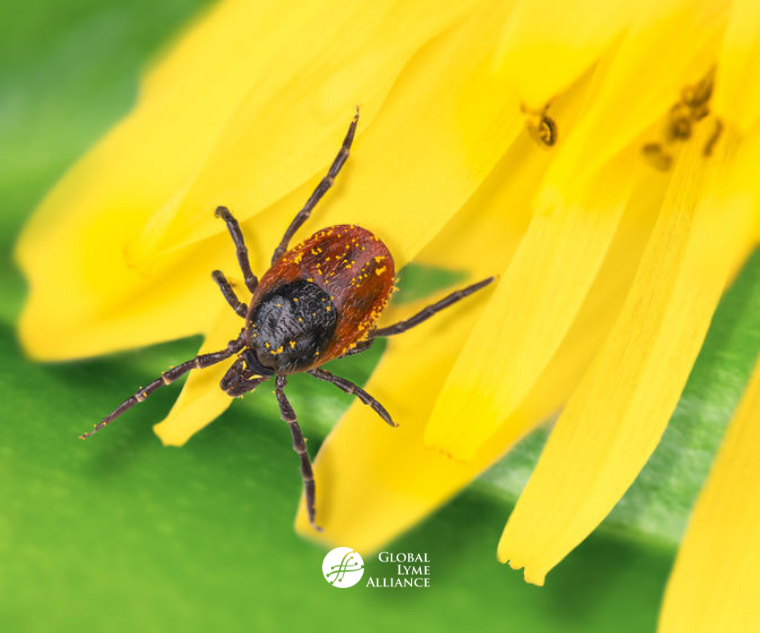
Sara Tyghter, Global Lyme Alliance's Director of Education and Outreach, talks about tick bite prevention and Lyme disease awareness with Tony Savino on 1490AM WGCH radio. Below is an excerpt.
Tony Savino, WGCH: I'm joined on the line by Sara Tyghter. Sara is Director of Education and Outreach at Global Lyme Alliance. And good morning Sara. Welcome. How are you? Sara Tyghter, GLA: Good, thank you. Yourself? WGCH: Doing okay. And recently you had a blog that GLA had about protecting yourself and guests from ticks at outdoor parties, a barbecue, et cetera. Tell us a little bit about that and what people should be aware of. GLA: Well, I mean summertime, there's lots of outdoor activities going on and most people I think, think about mosquitoes and how to avoid getting bitten by mosquitoes, but ticks are everywhere and unfortunately the number of ticks keeps increasing each year. And so it's important for people to start thinking about protecting themselves from ticks and being bitten by tick bites because unfortunately you can't see the ticks and you definitely don't feel then when they're biting you. WGCH: All right, so what should people know about stopping ticks from ruining a party and keeping them away. GLA: So, one thing is to protect yourself and protect your guests by maze spraying your yard is possible. Using a repellent is very important, but in advance of having an outdoor event, perhaps suggesting to your guests to spray with repellent before attending or setting up repellent station outside of your yard so that they can spray and protect themselves. WGCH: All right, now most people think it ticks, say you go into the woods, you're going to get these, but they can invade your party right there on the deck or what? GLA: They can. People will be out in the grassy areas and that's where it ticks can easily attached to them and then they can carry them on to the deck possibly. So any exposure to the grassy areas can definitely invite ticks to unfortunately, to feed on yourself or your guests. WGCH: Now what about DEET? You've heard a lot of things about that. Is that a good thing to spray on? GLA: I know DEET is probably one of the most known insect repellents. However, DEET does come with certain toxicities and so a lot of people may avoid using it because of that. We recommend Picaridin because it is very effective. It doesn't have those toxicities related to DEET. WGCH: Okay, what's it called again? GLA: Picaridin is the active ingredient. WGCH: Oh, I see. Is there a certain product that people can buy? GLA: Picaridin is in different products. Global Lyme Alliance, we have a partnership with Ranger Ready, which is a company that does produce a Picaridin repellent. WGCH: I see. Okay. But anything that has Picaridin in and it would be good. Okay. What about clothes? GLA: We recommend wearing long pants, long sleeves, light colored clothing so that you can see the ticks, however, that's not always possible with the warmer temperatures. And so some people may void doing that. You can spray your clothes with Permethrin in advance. And that's also another form of repellent that will protect yourself from ticks, and if possible you would spray your shoes, your socks, and your long pants. WGCH: That's possible also. All right. Now you mentioned, I mean do you want to exterminate the area, use all this kind of toxic spray and things like that, kind of bomb the whole area around your house? Is that what it would take? GLA: Well, I mean, there are some sprays that are not so toxic that are a little bit more organic in nature that you can use around the perimeters of your yard. And so basically those are the areas where the deer would be passing through from, like the wood barriers into your yard. So that's something that you know, people can do. There's different solutions for helping to eliminate or to reduce the number of ticks that are on your property. WGCH: All right. And of course tick checks, you mentioned that briefly. That's something people should do when they come indoors. GLA: People should do tick checks as soon as they come in indoors. If possible take a shower as soon as you come inside. Put your clothing in a dryer for 15 minutes at a very high heat, that kills techs. But there's one quick and easy way that you can also try to remove ticks from you, and if you're familiar with the winch roller with the tape, you can use that and just take that and go up against your clothing, your legs and arms. If there are any ticks that are crawling on you that would pick them up. So that's one quick, easy way that you can try to remove ticks from you if you're not able to get into a shower quickly. WGCH: Okay. So you can do that on your clothes. Can you do it on your person also on your skin? GLA: Yeah, it won't hurt you. I mean, it may pull in some hairs but it'll also pull the ticks off of you. So I mean that's a really quick, easy way to try to get the ticks that are still crawling. WGCH: And you've also got instructions on your website about tick removal, correct? GLA: That's right. BeTickAWARE.org is the site that you can go to to find out about how to check for ticks and how to remove ticks if unfortunately one does imbed. WGCH: All right, we have been joined by Sara Tyghter, GLA, Director of Education and Outreach at Global Lyme Alliance. Sara, always good to talk to you. Thanks very much for a few minutes this morning and some good advice. Listen to full interview.




-2.jpg)


